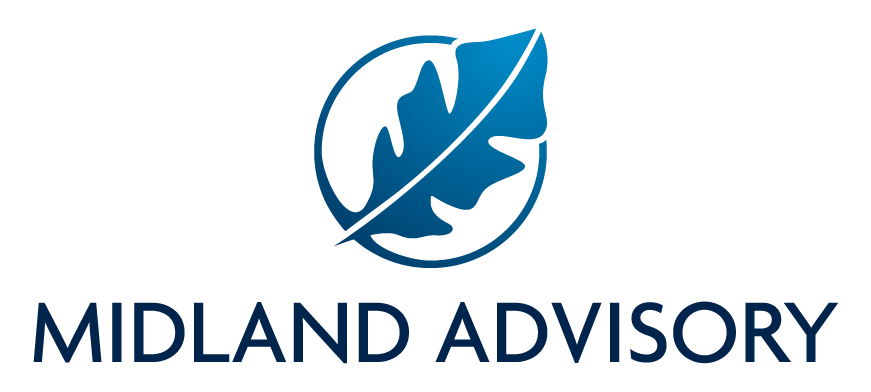Midland Advisory | Newsroom

Four tips for improving financial literacy
We often hear about the importance of financial literacy and how understanding the basic concepts of money management can help us make informed decisions. Unfortunately, many American struggle with financial literacy, with some studies indicating that only 57% of adults are financially literate.1 Being equipped with the skills to learn and navigate your finances effectively can lead to more confident decision-making about your budget, managing debt, choosing investments, preparing for retirement, and building your savings.
What is financial literacy?
Assessing your skills
- Do you know how to create a monthly budget?
- Are you actively trying to reduce your debts?
- Do you have an emergency fund?
- Do you know what insurance options are available that can help protect your finances and investments?
- Do you understand how investments work?
- Do you have a retirement savings plan?
Four tips to become more financially literate
- Start by budgeting
Practicing healthy spending habits is central to building more balance in life. If you’re living paycheck to paycheck or find yourself spending more than you’re earning, it is probably time to take a closer look. Your budget is essential to getting you on track with paying your expenses, eliminating debt, and saving for your short- and long-term goals. This money management tool allows you to map out how much money is coming in each month and where every dollar is going. Being able to pinpoint any unnecessary expenses or areas that are draining your savings can allow you to take action quickly and make necessary adjustments. As you regularly work with your budget and become well-versed in your saving and spending practices, you could automatically make a positive impact on your financial literacy. - Pay down debt
You likely have some debt, whether it’s your mortgage, car loan, credit cards, or student loans. When used responsibly, using a credit card or taking out a loan can be helpful in achieving your goals, but it’s important to be mindful of your spending and making sure these options fit in to your overall situation. A good goal to work toward is paying off your credit card balance every month. Otherwise, if you let the balance build over time, you can quickly be faced with a large amount of debt. Becoming financially literate includes understanding the impact of debt on your finances and taking steps to make payments on time, keeping spending within your means, and carving out space in your budget for paying down debt. - Save up in case of emergencies
Nearly a quarter of consumers have no savings set aside for emergencies3 which can lead to hardship quickly in the event of unexpected medical expenses, home or car repairs, or a loss of income. Without preparation, these expenses may have a dramatic and lasting effect on your future. Part of building financial literacy is understanding how crucial an emergency fund is in preventing debt from accumulating when unplanned expenses arise. By creating an emergency fund that includes three to six months of expenses, and regularly contributing money to it when you can, you’re able to stay more grounded during a challenging time. - Plan and develop goals for retirement
Along with keeping on top of everyday expenses and working toward your short-term goals, planning for the later chapters of your life is a critical piece of developing financial literacy. Either through your own research or by working with a financial professional, you can better understand which savings options are available and ways you can build your nest egg for the future.
An important part of retirement planning is considering both expected and unexpected expenses and the amount of income that will be needed to live comfortably and maintain your desired lifestyle when you leave the workforce. Once you have this estimated total, you can than set a target amount that you will need to save each month. The power is in the knowledge, so the more you become versed about retirement planning strategies, the better chance you’ll have of establishing financial security you can depend on down the road.
How to get started with basic financial literacy
Work with a financial professional
1. Investopedia, The push to require financial literacy education, 2023
2. Federal Reserve, Survey of household economics and decision making (SHED), 2022
3. Consumer Financial Protection Bureau, Emergency savings and financial security, 2022
The term financial professional is not intended to imply engagement in an advisory business in which compensation is not related to sales. Financial professionals that are insurance licensed will be paid a commission on the sale of an insurance product.
B1-MN-4-22
REV 3/2023
| Not FDIC/NCUA Insured | Not A Deposit Of A Bank | Not Bank Guaranteed |
| May Lose Value | Not Insured By Any Federal Government Agency | |
34297YREV 1-8-26
© 2012- Midland National. All rights reserved. Midland National is a member of 
Sammons Financial® is the marketing name for Sammons® Financial Group, Inc.’s member companies, including Midland National® Life Insurance Company. Annuities and life insurance are issued by, and product guarantees are solely the responsibility of, Midland National Life Insurance Company.
